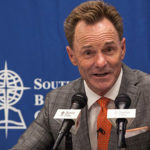WASHINGTON (RNS)—When it comes to politics, white evangelical Christians stand apart from every other religious group, according to a new poll conducted by the Public Religion Research Institute and The Atlantic.
The poll found 61 percent of evangelicals say the United States is headed in the right direction. By comparison, 64 percent of the overall public—including majorities of other Christian groups as well as religiously unaffiliated Americans—believes the country is seriously off track.
“White evangelical Protestants are sitting in their own unique space in the religious landscape on a whole range of issues,” said Robert Jones, CEO of research institute.
The survey, conducted in June from among 1,000 people, asked questions about voting and political engagement. But it also broke down respondents’ answers based on religious affiliation—white evangelical, white mainline Protestant, nonwhite Protestant, Catholic and religiously unaffiliated.
Continued support for President Trump
An overwhelming 81 percent of white evangelicals voted for President Trump, and they have generally stuck by him during his first 18 months as president.
Evangelicals widely hailed Trump’s nomination of Judge Brett Kavanaugh to fill retiring Supreme Court Justice Anthony Kennedy’s seat.
In recent days, Robert Jeffress, one of Trump’s informal evangelical advisers and the pastor of First Baptist Church in Dallas, called for an end to Robert Mueller’s investigation of possible collusion between the Russian government and the Trump campaign during the 2016 presidential election.
The PRRI poll showed 77 percent of white evangelicals view Trump favorably or mostly favorably, the highest percentage since the 2016 election. By comparison, 17 percent of non-white Protestants, a group made up of African-Americans and Hispanics, viewed Trump favorably or mostly favorably.
Least likely to view changing demographics positively
As a group, white evangelicals were also the least likely to view America’s changing racial demographic makeup positively. Fifty-two percent of white evangelicals said they felt negatively about the prospect that nonwhites would become the majority of the population by 2043. That fits with white evangelicals’ approach to immigration, their distrust of Muslims and support for a border wall with Mexico.
Sign up for our weekly edition and get all our headlines in your inbox on Thursdays
By comparison, all other religious groups in the survey viewed the changing demographics in mostly positive terms.
“I argued that white evangelical voters have really shifted from being values voters to being what I call ‘nostalgia voters,’” said Jones. “They’re voting to protect a past view of America that they feel is slipping away. That’s driving evangelical politics much more than the old culture-war dynamics.”
Brantley Gasaway, a professor of American religious studies at Bucknell University in Lewisburg, Pa., said white evangelicals’ fears about the nation’s growing racial diversity might be linked to their perception of religious diversity.
“They perceive that America becoming less white means America will become less Christian,” he said. “I don’t think that’s true. Many Latino immigrants are coming from predominantly Christian nations. But they perceive changes in racial demographics as being a threat to the predominance of Christians in the United States.”
As a group, white evangelicals are declining. A decade ago they made up 23 percent of the U.S. population; today it’s more like 15 percent, Jones said. But they have an outsize influence at the ballot box because they tend to vote in high numbers.
The one area where religious groups appeared united is in their support for legislation that would make it easier to vote—measures such as same-day voter registration and restoring voting rights for people convicted of felonies.
View media as biased
A majority of all religious groups, with the exception of nonwhite Protestants, saw media bias as a “major problem.” White evangelicals led the pack, with 79 percent saying media bias was a major problem. By contrast, 50 percent of religiously unaffiliated also said it was a major problem.
While most religious groups said they would prefer that presidential elections be decided by the national popular vote as opposed to the Electoral College, white evangelicals once again stood out: 52 percent said presidential elections should be decided by the Electoral College. (Trump won the Electoral College but lost the popular vote.)
The margin of error for the national survey was plus or minus 3.3 percentage points.














We seek to connect God’s story and God’s people around the world. To learn more about God’s story, click here.
Send comments and feedback to Eric Black, our editor. For comments to be published, please specify “letter to the editor.” Maximum length for publication is 300 words.